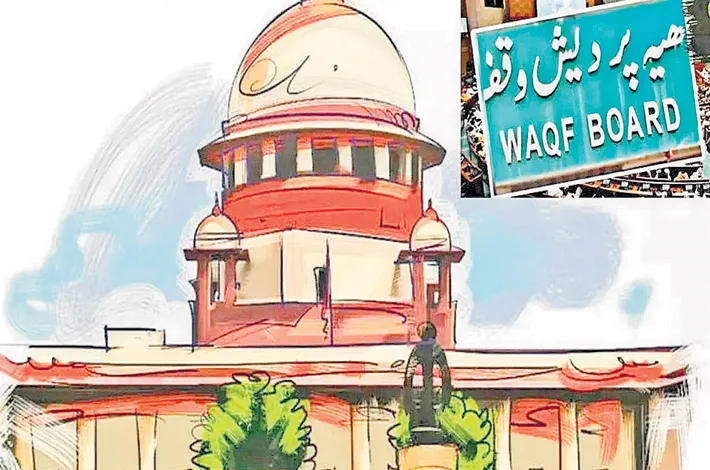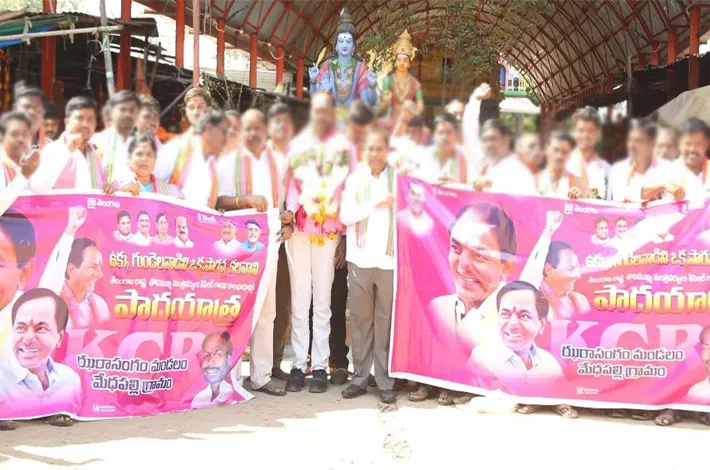The Waqf Act is weakening the Waqf Board
16-04-2025 12:00:00 AM

The 2025 Act is seen as dismantling these carefully built structures, replacing them with provisions that weaken the Waqf Board’s administrative role and threaten the sanctity of Waqf properties
The Waqf (Amendment) Act, 2025, recently passed by the Indian Parliament and assented to by President Droupadi Murmu, has sparked significant controversy, with its constitutional validity now under scrutiny. Challenged in the Supreme Court, with a hearing scheduled for April 16, the Act raises serious questions about its alignment with India’s constitutional framework and judicial precedents. Critics argue that it undermines the essence of the Waqf system, a centuries-old institution integral to Muslim religious and charitable practices, and violates fundamental constitutional guarantees.
A Clash with Constitutional Principles
At the heart of the controversy is the Act’s apparent conflict with Article 26 of the Indian Constitution, which enshrines the right of religious communities to manage their own affairs, including establishing institutions, administering properties, and practicing their faith. The Waqf system, rooted in Islamic tradition for over a millennium, has been a cornerstone of community-driven philanthropy in India since the Delhi Sultanate in 1206. The Act, however, introduces changes that critics say erode this autonomy. Notably, it contradicts the Supreme Court’s pronouncement that “once Waqf, always Waqf,” a principle affirming the inalienable nature of Waqf properties dedicated to religious or charitable purposes.
The Act’s provisions also raise concerns about procedural fairness and judicial independence. By designating the District Collector—a government official—as the arbiter in disputes involving Waqf properties, it creates a conflict of interest. The government, often a party to such disputes, cannot impartially adjudicate them. This shift from judicial or quasi-judicial bodies like Waqf Tribunals to executive authority undermines the rule of law and risks politicizing the administration of Waqf properties.
Historical Context and Regulatory Evolution
Waqf in India has a rich history, evolving through the Delhi Sultanate, Mughal era, and British colonial period. The British first attempted regulation in 1906, followed by the Waqf Validating Act of 1913, which clarified the legal status of family endowments, and the Waqf Act of 1923, which introduced accounting transparency. Post-independence, the Central Waqf Act of 1954 marked a significant step, followed by the more comprehensive 1995 Act under Prime Minister P.V. Narasimha Rao, amended in 2013 based on a parliamentary committee’s recommendations.
No other personal law in India has seen as much statutory intervention as Muslim Personal Law governing Waqf. Efforts to digitize Waqf property records began in 2010, with 42% completed, reflecting a commitment to transparency. Yet, the 2025 Act is seen as dismantling these carefully built structures, replacing them with provisions that weaken the Waqf Board’s administrative role and threaten the sanctity of Waqf properties.
Key Concerns with the New Law
Abolition of Waqf by User: The Act disregards the concept of “Waqf by User,” recognized by the Supreme Court in the Babri Masjid case. This principle acknowledges properties like mosques and graveyards as Waqf based on long-standing use, even without formal deeds. For instance, Babri Masjid and Delhi’s Jama Masjid, with centuries of religious use, lack formal documentation from their founding eras. The new law’s requirement for formal proof risks enabling the appropriation of such properties.
Application of Limitation Laws: Previously, Waqf properties were exempt from the Law of Limitation, protecting them from claims of adverse possession. The Act’s reversal of this exemption makes Waqf lands vulnerable. A notable example is the claim that Mukesh Ambani’s Antilia residence in Mumbai stands on Waqf land belonging to Currimbhoy Ebrahim Khoja Yateemkhana. Such disputes could now favor claimants citing prolonged possession.
Misinformation About Waqf Boards: The narrative that Waqf Boards arbitrarily claim properties is misleading. Union Minister Kiren Rijiju’s remark that the Waqf Board could claim Parliament itself exemplifies this rhetoric. In reality, Waqf property determination follows a rigorous process involving a Survey Commissioner, revenue records, and government approval, leaving no room for unilateral action by the Board.
Administrative Overreach: The Act divests Waqf Boards of their administrative role, transferring key powers to District Collectors. It also mandates non-Muslim representation in Waqf bodies, including the Central Waqf Council and Tribunals, raising questions about community autonomy. In contrast, bodies like the Tirumala-Tirupati Devasthanam enforce strict religious exclusivity, highlighting a double standard.
Restrictive Waqf Creation: The Act imposes a five-year “practicing Muslim” requirement for creating Waqf, excluding recent converts and non-Muslims, despite historical instances of Hindu Zamindars establishing Waqfs. This provision seems arbitrary and discriminatory, limiting the inclusivity of Waqf as a charitable institution.
The Broader Implications
The Waqf system is not merely a religious institution but a societal mechanism for philanthropy, akin to Hindu Religious and Charitable Endowments. While Waqf properties are estimated at six lakh acres nationwide, Hindu endowments, managing vast tracts from Vaishno Devi to Sree Padmanabha Swamy Temple, likely surpass this. Misrepresenting Waqf as a sprawling “land bank” fuels polarization rather than fostering understanding.
The Act’s proponents claim it streamlines Waqf administration, but its provisions suggest otherwise. By facilitating the conversion of Waqf lands into private or government property, it undermines the concept of Sadaqa-e-Jaria (continuing charity), where land dedicated to God remains inalienable. This shift contradicts the secular ethos of the Constitution, which prohibits the state from funding religious activities, making community-driven Waqf properties vital for maintaining mosques, madrasas, and graveyards.
A Call for Judicial Review
The Waqf (Amendment) Act, 2025, exacerbates longstanding issues like encroachments and disputes over Waqf properties, flagged as early as 1983 by Prime Minister Indira Gandhi in her 15-Point Programme for Minorities. Rather than resolving these, the Act risks alienating communities by projecting Waqf Boards as unchecked entities, despite their operation under government oversight.
As the Supreme Court prepares to hear the challenge to the Act, hopes rest on a verdict that upholds constitutional values and protects the Waqf system’s integrity. Declaring the Act ultra vires could reaffirm India’s commitment to religious freedom and equitable governance, ensuring that Waqf continues to serve as a beacon of charity and community welfare.
(Venkat Parsa is a senior journalist based in Delhi)








